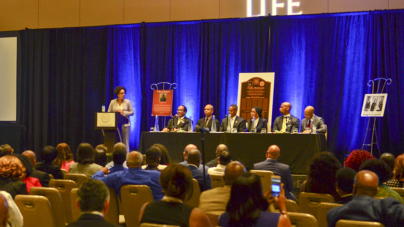
By Freddie Allen (Managing Editor, NNPA Newswire)
The New York Life insurance company recently hosted a panel discussion on bridging the racial wealth gap in Washington, D.C.
New York Life agents were in town for the company’s empowerment plan summit and to celebrate achieving their goal of reaching $50 billion in life insurance plans in the Black community.
The panel featured Dr. Benjamin F. Chavis, Jr., the president and CEO of the National Newspaper Publishers Association; Reverend Delman Coates, the senior pastor of Mt. Ennon Baptist Church in Clinton, Md.; Darryl De Sousa, the deputy commissioner of the Baltimore Police Department; Dr. Bahiyyah Muhammad, an assistant professor of sociology and anthropology at Howard University; Eugene Mitchell, the African American Market Manager for New York Life; and Jeff Pegues, the justice and homeland security correspondent for CBS News.
Mitchell said that he wanted people to know that New York Life and its agents take economic empowerment in the Black community very seriously, because economic disparities breed lack of opportunities.
“The root problem in our community is not crime, it’s not drugs, it’s not non-nuclear households, it’s the economy,” said Mitchell. “Wealth equals opportunity and the lack of wealth creates hard times.”
Mitchell continued: “We’re bringing this tool of life insurance into the Black community so that we can use it like other [communities] have used it for hundreds of years and to create an inheritance and generational wealth beyond covering the cost of the funeral.”
Mitchell said that, with the right policy, when a family member passes away and leaves $100,000 or $250,000 or $1,000,000 that money can be used as an investment to help purchase a house, to fund college education, for start-up capital to start a business or even charitable giving
“The understanding and conversations in the past have only been around burial policies and not tied to your value and worth,” said Mitchell.
Coates said that now that New York Life has reached the $50 billion-dollar goal, the Black community desperately needs a macroeconomic strategy that will help to preserve the value of that investment.
“We would be remiss if 20 years from now the value of that $50 billion is $5 billion,” said Coates. “If we’re going to address the racial wealth gap, we must address the macroeconomic mechanisms that causes money to be controlled by people who don’t look like us, by institutions that don’t represent us and that ultimately issue money as a debt in society.”
Chavis said that if we want to bridge the wealth gap, if we want to replace poverty with wealth, it first starts in the mind; it first starts in the consciousness.
“The problem is we don’t adequately utilize the blessings that all of us have,” said Chavis. “The truth of the matter is, our children are not born hopeless, they become that way. It does take a village to raise a child, but the problem is not the child, it’s the village.”
Chavis said that with the $50 billion dollar economic empowerment campaign, Eugene Mitchell and New York Life have shown that the Black families can instill wealth building into our mindset.
“We not only have to talk about building wealth, we have to show our people how to build wealth,” said Chavis. “We have to express wealth building in our community in a way that people feel the emotional impact of pooling [their] resources.”
Muhammad commended the life insurance agents in the audience for the work that they’re doing in the Black community and implored them to continue their outreach efforts.
“It will be difficult, people will give you attitude, you will get individuals that will call you naysayers or disrespect you; it’s a lack of knowledge,” said Muhammad, adding that sometimes it takes providing the information in different ways.
Muhammad continued: “We can’t blame one another for a lack of knowledge, if we don’t do everything we can to impart that knowledge.”


